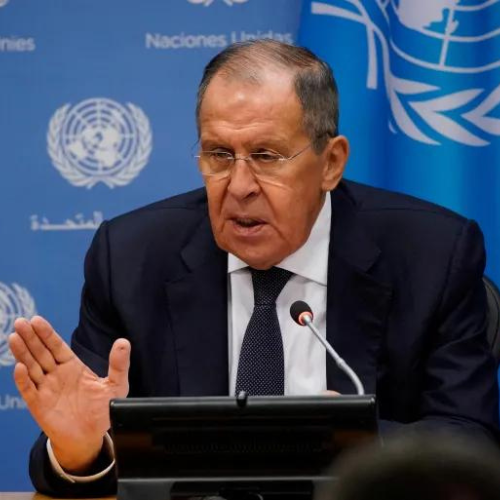In a recent address, Sergey Lavrov, the Russian Foreign Minister, urged Western nations to assume responsibility for the post-conflict reconstruction of Afghanistan, calling for the lifting of sanctions and the return of misappropriated Afghan assets frozen by Western powers. His statement, made at a high-level meeting in Moscow, highlights a growing consensus among several countries, including Russia, that the West has not done enough to ensure stability in Afghanistan after decades of military intervention.
Sergey Lavrov’s comments come in the context of Afghanistan’s worsening humanitarian crisis, which has been exacerbated by the Taliban’s takeover of the country in August 2021 and the subsequent economic fallout. Despite the international community’s withdrawal from Afghanistan, the nation remains a point of contention and responsibility for global powers, especially the U.S. and its NATO allies. Lavrov’s call serves as a reminder of the unfinished business in Afghanistan, where millions of people are suffering due to a lack of access to international aid and funds.
Sergey Lavrov Highlights the Frozen Assets Dilemma
One of the most pressing issues highlighted by Sergey Lavrov is the freezing of Afghan central bank assets by Western nations, particularly the United States. When the Taliban took control of Afghanistan in 2021, approximately $9 billion in Afghan central bank reserves were frozen abroad. Of this, around $7 billion is held in the U.S., while the remainder is spread across European banks.
The West, led by the U.S., has argued that releasing these funds to the Taliban regime could empower a government that remains internationally unrecognized and continues to face criticism for its human rights violations, particularly its treatment of women and minorities. The Biden administration has also voiced concerns that the funds could be misused to finance terrorism.
However, this has led to severe economic consequences for the Afghan population. Without access to these funds, Afghanistan’s already fragile economy has collapsed further, with rampant inflation, food shortages, and a deteriorating healthcare system. The country’s financial infrastructure, reliant on international aid for years, has been left crippled. Sergey Lavrov contends that this freezing of Afghan assets is a “misappropriation” of funds, as these reserves were built up for the Afghan people, not to be withheld by foreign governments.
Superyacht Flying Fox Removed from US Sanctions List and Returns to Global Charter Market
The Russian Foreign Minister’s call to return these assets is based on a humanitarian argument—that the people of Afghanistan should not suffer further for the political consequences of the Taliban’s rule. Lavrov’s remarks resonate with other nations, particularly those in the region like Pakistan and Iran, which have been directly impacted by Afghanistan’s instability through refugee flows and economic disruptions.
Sanctions and Their Impact
In addition to the frozen assets, Afghanistan remains under stringent economic sanctions imposed by Western nations. These sanctions, while aimed at curbing the Taliban’s activities, have had far-reaching consequences for the Afghan population. International organizations have repeatedly warned that the sanctions are aggravating an already severe humanitarian crisis in the country, where more than half of the population is at risk of starvation.
Sergey Lavrov’s demand for the lifting of sanctions mirrors the growing international concern that sanctions are hurting the Afghan people more than they are affecting the Taliban leadership. Sanctions have severely restricted Afghanistan’s access to global financial systems, making it nearly impossible for aid agencies to deliver essential services and funds to those most in need.
In recent months, various countries have tried to find middle-ground solutions, such as setting up a trust fund to manage Afghan assets in a way that bypasses the Taliban, but these efforts have yet to produce significant results. Lavrov’s remarks emphasize that the West must take responsibility for Afghanistan’s recovery, which involves not only humanitarian aid but also economic reintegration into the global community.
A Broader Critique of Western Policies
Sergey Lavrov’s statement also reflects Russia’s broader criticism of Western policies in Afghanistan. He has described the situation as a “stalemate” created by the West’s “cynical” approach, implying that Western nations are washing their hands of Afghanistan after decades of military involvement without addressing the long-term consequences. This critique aligns with Russia’s geopolitical interests in the region, as Moscow has been working to establish itself as a key player in Afghanistan’s future.
Russia’s stance, as articulated by Lavrov, is that the West should not abandon Afghanistan after its withdrawal, and it must instead engage in constructive dialogue and support to avoid a complete collapse of the country. The risks of instability in Afghanistan have far-reaching implications, including the spread of extremism and a potential refugee crisis that could affect the entire region, including Central Asia and Europe.


